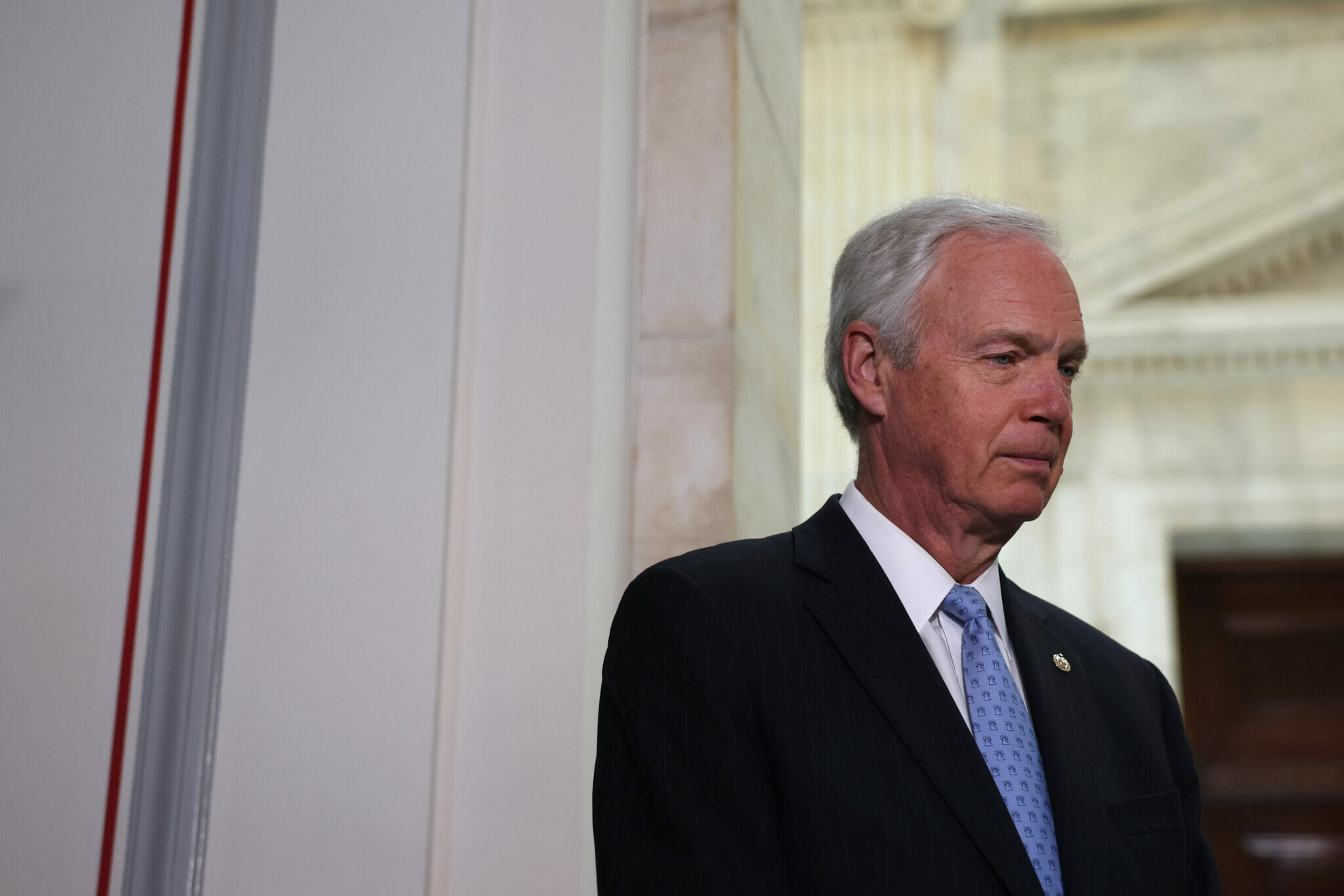Sign up to receive the weekly Climate Beat newsletter.
It’s a trope in political journalism to wonder whether high profile climate deniers are “in on the joke.” That is, do they realize privately that the science is unequivocal but cynically choose to claim the opposite in public? Or are they truly, hopelessly uninformed?
In a video obtained this week by CNN, US Senator Ron Johnson, Republican of Wisconsin, said the following in June during a luncheon with GOP women: “I don’t know about you guys, but I think climate change is bullshit.” (Johnson mouthed the operative word, as if that makes a difference.) He further claimed, falsely, that “more and more” scientists are debunking climate change—and he unironically said that taking climate action will be “a self-inflicted wound.”
That’s pretty straightforward. And given the private setting, it’s reasonable to conclude that Johnson—a man with virtually unlimited access to expertise and resources—actually believes it.
It’s not only politicians, of course. On Tuesday, the Wall Street Journal Editorial Board called an effort by French President Emmanuel Macron to amend his country’s constitution to account for climate change “the latest example in Western democracies of the disconnect between elites obsessed with climate change and the public.”
In fact, studies and surveys repeatedly show that the public is urgently concerned about climate change. A June report by the Yale Program for Climate Communication found that majorities in each of 31 countries surveyed, often by large margins, want governments to make climate change a priority; in the US, the majority is smaller but nevertheless clearly in favor of taking action. This, despite the fact that only one in five Americans realize that scientists agree that climate change is real, human caused, and very dangerous.
Climate denial and misinformation will likely get worse now that meaningful action is finally on the table. Today’s weather extremes are making the emergency increasingly obvious, yet misperceptions still pervade segments of both elite and mass opinion, particularly in the US. Some climate deniers doubtless don’t want to know any better. Some of the misperceptions, however, are rooted in years of inadequate media coverage. Journalists must now make the facts unambiguously clear to all audiences–including the fact that only rapid, far-reaching action will preserve a livable climate for all of us.
ICYMI, we wrote about climate misinformation, and the pitfalls for journalists to avoid, in February. Read the column…
NEWS FROM US
Extreme Weather Talking Shop TODAY. There’s still time to register for our webinar—focused on extreme weather, particularly in the American West, and featuring stellar panelists from The Washington Post, Los Angeles Times, and NPR—which kicks off July 8, at 1 p.m. US Eastern Time/10 a.m. Pacific. Learn more and register now…
Reading this too late to join? Stay tuned for a recap and complete recording of the event!
Climate Crimes. Last week, The Guardian, in collaboration with CCNow, kicked off a yearlong series investigating the most consequential corporate deception campaign in history—the fossil fuel industry’s decades of misleading the press, the public, and policymakers about climate science. Stories from the series will regularly be available for publication by CCNow partners, including four already which are evergreen, if you missed them last week. Copy and relevant assets for the series will all be in this Google Drive folder…
ESSENTIAL CLIMATE COVERAGE
- “Extreme weather rules the week.” So says CBS climate specialist Jeff Berardelli. Tropical Storm Elsa, downgraded recently from a Category 1 hurricane, is dumping rain across Florida and the Eastern Seaboard, raising flood risks all across the Gulf Coast. (“Yes it is extremely early in the season for this, but here we are,” Berardelli said on air Wednesday.) Meanwhile, another extreme heatwave is underway in the West. From CBS News…
- India ablaze. Millions in northern India are suffering amid an ongoing heatwave, due to late-coming monsoon rains, that has seen more than a week straight of daytime temperatures surpassing 100 degrees Fahrenheit. Swaths of central and western India are also ablaze. From Al Jazeera…
- Burnt out. Facing longer, more intense wildfire seasons, firefighters in the American West are struggling with low pay, trauma, and exhaustion—and governments are struggling to recruit, leaving communities ultimately ill-prepared. From The Washington Post…
- To have and have not. Roughly 700 million people live in low-lying coastal zones, vulnerable to sea level rise and other climate effects. As the climate emergency worsens, two classes will emerge, writes hydrologist and climatologist Peter Gleick: those with the means to relocate, and those who will be left behind to suffer “illness, death and destruction.” From The Guardian…
- Rhetoric v. reality. Last week marked 150 weeks since Sweedish climate activist Greta Thunberg began her signature “school strike for climate protests,” which inspired millions of young people around the world. At last week’s Austrian World Summit, Thunberg denounced leaders for only “pretending to take responsibility, acting as saviors while [they] try to convince us that things are being taken care of.” The gap between leaders’ rhetoric and reality, she said, is still growing. From The Nation…
- Oil rich, job poor. Around the world, demand for oil and gas have rebounded, as major economies re-open. In New Mexico, production and delivery to market (not to mention emissions) are breaking records. What isn’t returning? Jobs. And lots of them, with the oil-rich Permian Basin projected to become the only part of the state where employment won’t return to pre-pandemic levels. From Capital & Main…
REPUBLICATION RECOMMENDATIONS
The following stories deserve special consideration for republication by CCNow partners:
- New Mexico Oilfield Jobs Not Projected to Rebound – Capital & Main
- A quest for Alaska oil sparks a fight over tribal sovereignty – High Country News
- The climate crisis is a crime that should be prosecuted – The Guardian
- US cities are suffocating in the heat. Now they want retribution – The Guardian
For partner outlets: to submit stories for sharing, please use this form. As always, instructions for republishing and the full list of stories available for republication can be found in our Sharing Library.
ODDS & ENDS
Registration open for COP26. Journalists and other attendees can apply now to attend the COP26 global climate summit in Glasgow, set for October 31 to November 12. Moreover, journalists who have not yet been vaccinated against Covid-19, and are not otherwise able to obtain the vaccine, may do so through the UK COP Presidency. Registration information is here, and information on getting the vaccine is here.
Calling it an “emergency.” For Yes! Magazine and her newsletter “Minimum Viable Planet,” Sarah Lazarovic unpacks from her vantage point why normalizing the term “climate emergency,” versus “climate crisis” or “climate change,” is so important. “If climate change is the default, anything beyond those words will seem over-the-top,” she writes. “But anything less than an accurate definition of what is happening (breakdown, crisis, emergency) undermines the severity of our situation.” Hear, hear! Read her piece…
And ICYMI, this spring CCNow and several of our earliest and largest partners issued a statement on the climate emergency. We urge all newsrooms to add their names as signatories…
Jobs. So many jobs are opening up at outlets around the US, on beats with strong connections to climate. Like last week, we encourage folks to check out Mandy Hoffmockel’s excellent excellent “Journalism Jobs” newsletter on Substack. The Arizona Republic, in particular, is hiring a climate news & storytelling reporter. The Boston Globe is hiring a web producer for climate. And The Guardian is hiring a senior reporter to cover climate justice!

